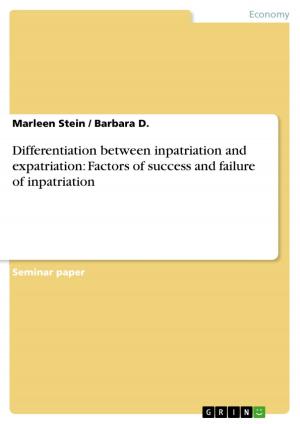Hybrid dynamics in large-scale logistics networks
Business & Finance, Management & Leadership, Production & Operations Management| Author: | Mykhaylo Kosmykov | ISBN: | 9783656274049 |
| Publisher: | GRIN Publishing | Publication: | September 18, 2012 |
| Imprint: | GRIN Publishing | Language: | English |
| Author: | Mykhaylo Kosmykov |
| ISBN: | 9783656274049 |
| Publisher: | GRIN Publishing |
| Publication: | September 18, 2012 |
| Imprint: | GRIN Publishing |
| Language: | English |
Doctoral Thesis / Dissertation from the year 2011 in the subject Business economics - Supply, Production, Logistics, grade: Doctor of Philosophy, University of Bremen, language: English, abstract: We study stability properties of interconnected hybrid systems with application to large-scale logistics networks. Hybrid systems are dynamical systems that combine two types of dynamics: continuous and discrete. Such behaviour occurs in wide range of applications. Logistics networks are one of such applications, where the continuous dynamics occurs in the production and processing of material and the discrete one in the picking up and delivering of material. Stability of logistics networks characterizes their robustness to the changes occurring in the network. However, the hybrid dynamics and the large size of the network lead to complexity of the stability analysis. In this thesis we show how the behaviour of a logistics networks can be described by interconnected hybrid systems. Then we recall the small gain conditions used in the stability analysis of continuous and discrete systems and extend them to establish input-to- state stability (ISS) of interconnected hybrid systems. We give the mixed small gain condition in a matrix form, where one matrix describes the interconnection structure of the system and the second diagonal matrix takes into account whether ISS condition for a subsystem is formulated in the maximization or the summation sense. The small gain condition is sufficient for ISS of an interconnected hybrid system and can be applied to an interconnection of an arbitrary finite number of ISS subsystems. We also show an application of this condition to particular subclasses of hybrid systems: impulsive systems, comparison systems and the systems with stability of only a part of the state. Furthermore, we introduce an approach for structure-preserving model reduction for large-scale logistics networks. This approach supposes to aggregate typical interconnection patterns (motifs) of the network graph. Such reduction allows to decrease the number of computations needed to verify the small gain condition.
Doctoral Thesis / Dissertation from the year 2011 in the subject Business economics - Supply, Production, Logistics, grade: Doctor of Philosophy, University of Bremen, language: English, abstract: We study stability properties of interconnected hybrid systems with application to large-scale logistics networks. Hybrid systems are dynamical systems that combine two types of dynamics: continuous and discrete. Such behaviour occurs in wide range of applications. Logistics networks are one of such applications, where the continuous dynamics occurs in the production and processing of material and the discrete one in the picking up and delivering of material. Stability of logistics networks characterizes their robustness to the changes occurring in the network. However, the hybrid dynamics and the large size of the network lead to complexity of the stability analysis. In this thesis we show how the behaviour of a logistics networks can be described by interconnected hybrid systems. Then we recall the small gain conditions used in the stability analysis of continuous and discrete systems and extend them to establish input-to- state stability (ISS) of interconnected hybrid systems. We give the mixed small gain condition in a matrix form, where one matrix describes the interconnection structure of the system and the second diagonal matrix takes into account whether ISS condition for a subsystem is formulated in the maximization or the summation sense. The small gain condition is sufficient for ISS of an interconnected hybrid system and can be applied to an interconnection of an arbitrary finite number of ISS subsystems. We also show an application of this condition to particular subclasses of hybrid systems: impulsive systems, comparison systems and the systems with stability of only a part of the state. Furthermore, we introduce an approach for structure-preserving model reduction for large-scale logistics networks. This approach supposes to aggregate typical interconnection patterns (motifs) of the network graph. Such reduction allows to decrease the number of computations needed to verify the small gain condition.















